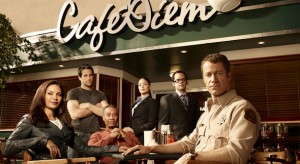 After five seasons of sci-fi adventure-comedy riddled with speculative technology and its accompanying speculative technobabble, SyFy channel’s Eureka recently ended its final season. Eureka is set in a fictional small town—called Eureka—that doubles as a Research and Development think tank for the US Government. The town is populated by the world’s most brilliant technological and scientific minds, recruited by the government in order to produce Advanced Science with apparently limitless resources, a bastion of research where the intellectually superior can devote themselves to a life of pure intellect free from the concerns of the outside world. As a SyFy show with such a premise and recurring guest stars like Wil Wheaton and Felicia Day (both rockstars in and active promoters of nerd/geek culture), Eureka caters primarily to a niche nerd/geek/(insert your label of choice here) audience.
After five seasons of sci-fi adventure-comedy riddled with speculative technology and its accompanying speculative technobabble, SyFy channel’s Eureka recently ended its final season. Eureka is set in a fictional small town—called Eureka—that doubles as a Research and Development think tank for the US Government. The town is populated by the world’s most brilliant technological and scientific minds, recruited by the government in order to produce Advanced Science with apparently limitless resources, a bastion of research where the intellectually superior can devote themselves to a life of pure intellect free from the concerns of the outside world. As a SyFy show with such a premise and recurring guest stars like Wil Wheaton and Felicia Day (both rockstars in and active promoters of nerd/geek culture), Eureka caters primarily to a niche nerd/geek/(insert your label of choice here) audience.
However, we experience Eureka through the eyes not of one of its many scientific geniuses, but of its most average citizen. Jack Carter, the show’s protagonist, is remarkable for being ordinary. Thrust into the role of sheriff after an accidental arrival, Carter is immediately bemused and disoriented by his new role as one of Eureka’s few denizens of average intelligence. At first glance, Carter appears to be a classic example of a bumbling Everyman, spending much of his time confused and uncomfortable with the intellectual prowess of those around him. The curious incongruity to this narrative, however, is that in both Eureka’s “monster of the week” episodic narrative and their season-length story arcs, it is Carter who consistently rescues other characters and recognizes solutions to crises facing the town, typically through creatively piecing together information supplied by his smarter scientist friends. The writers regularly produce a deus ex Carter to save the Eureka from disaster.
But is the deus ex Carter really just a narrative cop-out? When examined more closely, could this narrative pattern have a deeper point? Like its titular town, Eureka the show could be seen as a kind of think tank for pondering the nature of the human intellect. After five seasons of Carter’s unorthodox successes, I suggest that Carter’s unique problem-solving abilities ultimately inform a more nuanced theory of human intelligence than the traditional scientific mindset upheld by Eureka’s geniuses and, by extension, the show’s audience. In Carter’s incongruently savvy heroism, Eureka deploys a carefully constructed, devastating critique of the very scientific elitism that Eureka’s niche audience is likely to endorse.
Carter’s Unmeasured Intelligence
In order to discuss Eureka’s handling of human intelligence, it’s necessary to briefly touch on some intelligence theory. The famous, standard method for assessing a person’s level of intelligence is an IQ test. Commonly measured on something like the Stanford-Binet intelligence scales, an IQ score is a single number that represents an individual’s “intelligence quotient.” IQ rests on the concept that intelligence theorists call the ‘g’ theory of intelligence: ‘g’ stands for general intelligence, a measurable, single quantity summed up by an IQ score that ranges, roughly, from about 20–160+ (because of complicated ceilings, the assessment of highly gifted people is usually inaccurate past 160). The distribution of IQ in the population is centered around 100, meaning that a score of 100 is dead average.
IQ scores are widely used in the assessment of intelligence, but some researchers have argued that an IQ test doesn’t provide a complete picture of human ability. Howard Gardner, a developmental psychologist, proposed Multiple Intelligences Theory as a contrast to the traditional, single ‘g’ measure of intelligence. According to Gardner, human beings possess discrete and not necessarily correlated cognitive abilities that cluster into various realms of “intelligence” such as logical-mathematical, musical, interpersonal, spatial, and bodily-kinesthetic intelligences. IQ scores may reflect some of these abilities—like verbal, mathematical, and spatial—but not others, like musical or bodily-kinesthetic. Another psychologist and challenger of ‘g’, Robert Sternberg, proposed a triarchic theory of intelligence and also argued that IQ does not provide us with an accurate picture of human abilities. In the triarchic theory, human intelligence arises out of a composite of analytical, practical, and creative cognitive abilities, and these practical and creative intelligences are two components typically underestimated by traditional IQ measures, which align more closely with analytical skills. Gardner and Sternberg’s two theories are perhaps the strongest competitors of the standard ‘g’ theory of intelligence.
All right, so back to intelligence in Eureka. At first glance, in the Eureka universe standard ‘g’ theory measures of assessment seem to be used without question. And by these measures, Carter is unquestionably lacking. Carter’s high school GPA was 2.8, a C average. In S02E05, “Duck Duck Goose,” Carter is revealed to have an IQ score of 111. This actually places him slightly above average, but it garners him nothing but mockery from Eureka’s geniuses, including his romantic rival Nathan Stark, who spends the majority of the first few seasons providing a standard of genius against which Carter can never hope to compete.
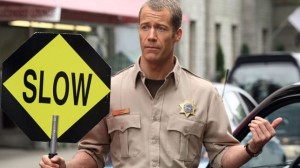
No Need to Rub It In
But Carter can compete on more unorthodox, unmeasured skills, in fact, through exactly the kinds of intelligences discussed by both Gardner and Sternberg. Carter possesses both incredible bodily-kinesthetic abilities as well as practical and creative intelligence, harnessing the acumen of those around him and generating solutions from that expertise. And it’s here, in both physical feats and in the practical and creative realms of synthesis and application, where Carter shines.
Despite his apparent scientific ignorance, Carter excels in simplifying complicated scenarios and communicating them effectively. The ability to make others see the relevance of new and unusual information is a hallmark of Sternberg’s practical intelligence, and Carter has this skill in spades. In a typical example of Carter’s creativity, in S05E11, “Mirror Mirror,” Carter draws on his everyday life experience with garage door “clickers” to propose a solution to finding a signal on a particular frequency. “Who says you’re not science-y?” one of the characters exclaims. “Almost everyone,” Carter muses, noting with the audience that his near-constant discovery of clever solutions goes unnoticed and unmeasured because he does not conform to traditional achievement measurements. Lacking formal expertise in math and physics, Carter lets the scientists assess a crisis situation and provide him with the facts. This is an efficient and highly successful strategy: instead of taxing his own resources, Carter is able to outsource the scientific understanding to a cadre of geniuses and devote his own mental energy to discovering the forest while the scientists examine the trees.
And in line with Gardner’s theory, Carter’s non-measurable intelligence is also exemplified by bodily-kinesthetic intelligence. Carter’s trademark job is a one-man end-of-episode bomb-squad: if someone’s science is malfunctioning in Eureka, it will undoubtedly be Carter who has to risk life and limb to throw a switch, release an anti-bomb, and save the day. If Carter is just a bumbling Everyman, then his genius friends’ willingness to throw him nonchalantly in the face of terrifying physical danger is merely evidence for his expendability. After all, with his average IQ, Carter the sheriff is the most replaceable person available for high-risk situations. Yet when these dangerous scenarios are examined, it becomes clear that there is much more at work here than the geeks using Carter as cannon fodder. If Eureka is indeed challenging to the traditional IQ model, perhaps the most strikingly nontraditional ability to laud is something like Gardner’s bodily-kinesthetic intelligence.
Carter routinely displays superhuman levels of bodily-kinesthetic intelligence, and is implicitly trusted as the only capable of extremely sensitive spatial, and kinesthetic calculations in a high-risk, high-pressure environment. In S04E14, “Up in the Air,” despite his protestations, Carter adjusts admirably to constantly rotating spatial orientation in a floating house. In another typical day at the office, Carter delivers an anti-matter bomb into a black hole according to a precise time and spatial window (S04E20). Carter is the opposite of expendable; his action-hero feats are an application of Gardner’s bodily-kinesthetic intelligence that allows him to control his physical performance at the level of an Olympic athlete’s precision.
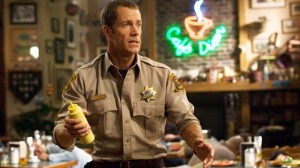
Battling invisible flying drones with mustard takes some serious bodily-kinesthetic intelligence.
Carter as a Guardian Against Abstraction
Beyond his distinctive and overlooked intellectual gifts, Carter also serves as a beacon for humanity within Eureka, constantly pulling the scientists back into the real world and serving as a guardian against disembodied abstraction. Carter’s unorthodox bodily-kinesthetic intelligence and his intuitive connection with reality are emphasized during the final season-long story arc of season five.
In the first part of the season, Carter rescues members of the town from imprisonment by Beverly Barlowe, a returning villain who had been the town’s former psychologist and who is a member of the shadowy Cosortium that claims Eureka’s government-controlled weapons projects are too dangerous to continue. As a psychotherapist, Barlowe is along with Carter one of the few characters in the show who is not tied to the hyper-analytical, hard-science perspective of the majority of the town’s scientists. Though a villain, Barlowe actually reinforces Carter’s technological paranoia as she consistently points to real flaws in the Eureka scientists’ pursuit of science without the direction of a moral compass or emotional understanding of the consequences of their technology.
In this story arc, key scientists are trapped in a “cerebral” existence in a computer program, a construct that enables the writers to highlight Carter’s connection to bodily-kinesthetic reality, set explicitly against the “disembodied science” of a computer program. It is Carter—with neither technological nor scientific expertise—who is chosen enter this dangerous simulated world, and his ability to bring his mentally hijacked friends back to reality is a testament to Carter’s deep ability to ground himself in tangible reality, resisting the dangers of technological abstraction. In a sci-fi universe fraught with mind-body gaps and machine consciousnesses downloaded to digital memory, Carter serves as grounding to corporeal reality, calling the other protagonists back from dangerous alternate realities. Consistently suspicious of technological interventions, Carter is often the first to correctly assess the risks associated with relying too much on technology and, in a town with a morality rate twice the national average, it’s Carter who keeps the scientists safe.
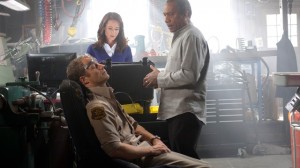
Into the incarnate
And in the series finale, Carter rescues the town from a series of wormholes by throwing himself bodily through them. Holly Marten, recovering her memory of the town as part of a secondary plot, exclaims: “I remember now! You guys are smart, but the Sheriff is the strong force, he holds it all together!” Carter is Eureka’s essential component, the protective force against scientific destruction.
Finally, in S05E09, “Smarter Carter,” Carter trades his own unique skillset for traditional giftedness, with devastating consequences. Carter is transformed into a highly analytical, intelligent scientific theorist, and he proudly announces that he knows all the penal codes in detail. Andy, Eureka’s robotic deputy with an accompanying computer memory, points out “but I already know all the codes, you don’t need to!” This statement reflects the inefficiency of this new expertise; while in the abstract Carter now knows more than he did before, this is a waste of his resources. Carter begins to lose touch with the practical skills he had evidenced before.
More frighteningly, increasing Carter’s IQ correlates with an equally impressive increase in psychopathology. “Smart Carter” goes on to ignore his partner Allison’s emotions and ultimately to endanger Andy’s wellbeing, his lack of concern springing from a blinded focus on scientific inquiry. Devoting himself to theoretical research, Smart Carter ignores Andy’s well-established identity as a robotic person and sees him only as a replaceable machine object, in contrast to normal Carter’s empathic friendship with the robot. And of course, the episode is only resolved with restoring Carter to his former self, “curing” him of the genius that was crippling his ability to connect with both practicality and empathy.
And here we arrive at Eureka’s most challenging argument for why it’s important to diversify our conceptions of intelligence: in the absence of practical, and intuitive intelligences like Carter’s and his ability to question technological abstraction, genius flounders. Being “IQ smart” is simply not enough, either in solving problems or in making ethical decisions, and leads us to ignore a vast range of human abilities. And more, relying on traditional IQ intelligence alone is dangerous and ultimately destructive to our most intuitive, compassionate selves.
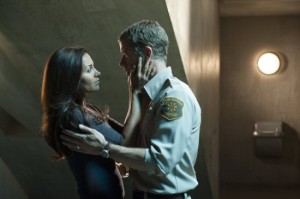
In curing Carter of his new high IQ, Allison protests: “I don’t care about his research, I care about him!” Music to any pre-tenure scientist’s ears.
Eureka’s Challenge
Eureka appeals to a core audience of nerds and presents them with what initially seems like nerdvana: a mythical town where intelligent geekiness is exalted and the scientifically gifted rule the roost. The audience for a sci-fi adventure show is likely to identify with Eureka’s scientists: smarter than everyone around them, brought into a place (town, cable network) where they can happily devote themselves to Science (fiction) without having to worry about a world that fails to understand them. Furthermore, nerd/geek culture tends to protest that not only do intelligence and erudition make up for social and emotional deficits, but also that intelligence is enhanced by fewer practical and emotional concerns. One of the most common tenets of science fiction, after all, is that the future will advance towards a highly technologically and scientifically dominated worldview.
But surprisingly, Eureka takes this initial appeal and flips it on its head. Instead of catering to the self-aggrandizing fantasies of a niche audience, Eureka challenges its audience’s elitist assumptions. By pointing out the importance of alternative modes of thought and by highlighting a character consistently assessed as intellectually average, Eureka argues for the uncomfortable possibility that abstract intellectual prowess alone is simply not good enough, and that standard methods of intelligence assessment overlook fundamental human talents. Moreover, Eureka argues that the elite scientific community of Eureka cannot even survive without people like Carter: those skilled in interpersonal communication, unorthodox problem-solving skills, and alternative forms of intelligence such as bodily-kinesthetic intelligence. Eureka’s emphasis on practical and emotional intelligence, as well as the stark dehumanization that can result from losing touch with those intelligences, illustrates what is lost if cerebral analysis is exalted at the cost of practical and emotional realities. Eureka’s message is clear: respect the diversity of human ability and challenge scientific elitism, or suffer the consequences.
Catherine Hicks is a PhD Candidate in Psychology in San Diego who studies academic achievement, competition, and implicit theories of intelligence. She spends a lot of time arguing about the nature of genius, dancing whenever there is music playing, and thinking of ways to subvert traditional education systems.
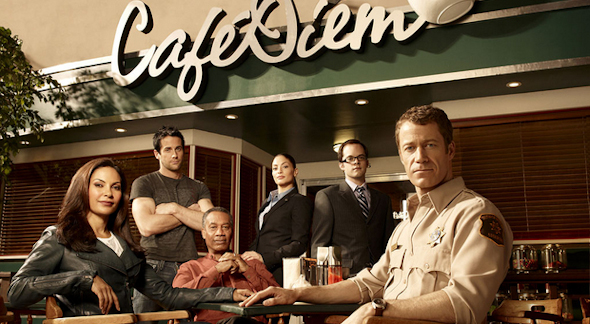
This sort of populism drives me nuts. It’s hardly a risk for Eureka to glorify the street smarts of the everyman. Show me one successful TV show that follows scientists without doing that. Even if you assume that all sci-fi fans carry those “elitist assumptions”, Eureka is not targeted at hardcore sci-fi fans. It’s aimed at a casual audience, which, despite their original branding, Syfy has always wanted to grab in the worst way.
It’s all fun and games when it’s a TV show, but in America this attitude is in the process of having global consequences. We’ve got climate change, “creation science”, confusion about magnets and how do they work, you name it. And it’s always the argument from common sense that the ignorant go to. Obviously the earth isn’t getting warmer because we have snowstorms, for instance.
I agree that the current “anti-scientific” attitude is a dangerous and troubling trend in America, especially in our political scene. However I don’t think that’s what Eureka is proposing — despite the pitfalls and crises experienced in the town, they are consistently shown as producing invaluable scientific research. Jack Carter doesn’t overthrow the scientific method by any means, nor does he operate on something as nebulous as “common sense.” Rather, Jack is able to synthesize and creatively problem-solve with large amounts of information (information that he wouldn’t have access to were it not for the brilliant scientists around him). The point is that you need both, and that skills like Jack’s are in fact more depthful and difficult than “common sense.”
The assumption of the target audience for Eureka is, of course, probably a bit of an overthinkingit assumption but not a terrible stretch considering the demographics of SyFy watchers especially when Eureka started.
Just watched the show on Amazon (yeah, many years past its prime), and I think I agree with Hicks here. It’s a valuable lesson that many scientists trying to spin-out their lab ideas into companies often have to learn the hard way. Great though an analytical mind may be, there’s a reason why you need project managers and a CEO who knows how to finesse the social grease of investors. A company of only analytical scientists tends not to work. You could say that Carter is the project manager of Eureka Disasters.
Similarly, see the current boat-load of issues with dumping novel AI technology into society without a solid foundation in Ethics.
I think it’s definitely true that Eureka is serving as a critique of scientific elitism. Here’s my question: Doesn’t that put it in exactly the same category as basically every single piece of popular sci-fi ever? Is there some tide of popular culture that’s advocating and glorifying scientific elitism that I missed?
The trope of the ordinary person whose common sense or emotional insight ends up trumping education and rationalism is so pervasive in popular sci-fi as to be practically universal. Scientific ambition as hubris might literally be the oldest trope in the genre. (“Frankenstein: The Modern Prometheus”.)
“Standing up for different intelligence types” is certainly a valid reading, but I think it’s a little charitable. Eureka is doing exactly the same thing as virtually every other piece of pop culture does when it depicts smart people: assures the audience that smart people aren’t *really* better than they are. That, in fact, traditional intelligence is actually dangerous and/or crippling. That’s not unique to Eureka; that’s one of our cultural ur-themes.
If there were boatloads of pop narratives where smart, ambitious, educated, rational people went around saving the world by cleaning up the mistakes of wise, humble, athletic, emotional people, that would be one thing.
But I’d lay money that for every one of those stories you can name, I can name two that go the other way.
It’s true that the dangers of “over-rationalization” is a pretty pervasive warning in a lot of stories.
But critiquing smart people is not the same as saying that our definition of “smart” is wrong to begin with; it’s not simply that Carter rescues the scientific thinkers with total novel insights but that his skillset operates in an ecosystem of intelligences that require both the information from better scientific thinkers as well as his own unique insights.
As to sci-fi narratives in general, that’s a difficult generalization to make but I think you have to allow a certain demonizing of human emotion to be a fairly universal trope as well, with many dirges sung about the dangers of man’s less analytical, even brutish, side wherein emotion, intuition, and all sorts of skills are lumped together as unevolved and unsophisticated.
Are you familiar with Eureka’s sister show, Warehouse 13? I think it actually makes a better example of multiple intelligence types.
To over simplify drastically, in the prototypical Eureka episode, the world is idyllic, then traditionally-smart people screw it up with their meddling, then Carter either fixes it or provides the catalyst to help traditionally-smart people fix it.
In the prototypical WH13 episode, the world is strange and dangerous (artifacts killing people), and dealing with takes Myka (reserved, educated, deductive, photographic memory) and Pete (emotional, athletic, impulsive, slightly psychic) working together.
I’m curious as to what popular sci-fi you would consider dismissive of emotion and intuition. Can you give some titles or examples? I can definitely think of stories set in societies where emotions are systemically repressed by technology. They are, universally, dystopias.
Star Trek is probably the most rationalist/optimist pop franchise I can think of, and it’s still chock-full of stories about the importance of emotion and human imperfection. (How often would you hear the phrase “You know, Spock/Data, you were right, the logical approach was the best way to deal with that situation!”?)
Good call on Warehouse 13
I feel like the other comments here are confusing criticizing scientific elitism with criticizing all science fiction and every nerd ever.
I don’t think the comments apply to “all science fiction”, merely most/all TV and movie science fiction. In written work it is very common for the protagonist to be an intellectual and scientifically-inclined, and often the hero is unappreciated by his less intellectual compatriots.
I’d argue that about the only place one sees the intellectual scientist routinely presented in a positive light in visual media is in the disaster movie. Films like Sunshine, The Day After Tomorrow, Volcano, and even Independence Day portray intellect in a positive way, at times even remediating problems caused by insufficient reflection of the populace at large.
But other than this genre, we really don’t see scientists as heroes. Even in the best that TV has to offer for science fiction, such as Battlestar Galactica, Fringe, and Star Trek, the scientist is often the cause of the conflict, with a narrow overly-intellectualized view of humanity, or just hubris, that produces horrific results. (Indeed, for the first two shows on that list, that’s the central inciting situation.)
And, to be fair, I’d describe Eureka as more science fantasy than science fiction. That distinction may make me an uber-nerd, but I think it is important because I think it indicates the attitude of the show in general toward science, which is pretty dismissive. Actual scientific principles really aren’t portrayed on the show — instead, any silly technobabble is sufficient as long as it advances a particular plot point. The “science” might as well be unconstrained magic for all the sense it makes. (I suppose that could be an intentional attempt to make us as viewers see Eureka as Carter must — nearly incomprehensible, with no real underlying scientific principles, but instead with rules that need to be worked out, and only dimly grasped, for each unique situation.)
Tulse, while BSG and Fringe both feature scientists that cause their “central inciting situation,” I think it’s important to note that neither man does so for a narrow overly-intellectualized view of humanity or hubris. Gaius Baltar’s great crime is motivated by his sex drive; a business favor for his mistress. Walter Bishop’s is motivated by paternal love for his son. In both instances, “science” isn’t in the moral wrong.
(Granted, Fringe plays heavily into the mad scientist running amok trope over the course of its seasons, but most of the time the scientists are motivated as Walter was — by love and loss. nBSG… well, nobody comes off clean in that show.)
You make a good point, in that neither example is a classic mad scientists. That said, I think it is arguable that in both cases it is hubris that causes the initial situation. Baltar is a horndog, but he is also exceedingly smug about his intellect, and simply cannot imagine being duped himself. And I think even a better case can be made for Walter’s main failing as hubris — he thinks he can save a version of his son in another frackin’ universe! (Oh, sorry…”spoiler alert”.) Certainly in Baltar’s case his actions are seen as a character flaw, and with Walter, well, I don’t see how conducting pharmacological experiments on children to induce weird powers doesn’t qualify as missing a major bit of empathy and ethics (oops…again, “spoiler alert”.)
To be fair, Star Trek itself can often be guilty of “unconstrained magic” posing as science. I can’t think of any major sci-fi series that isn’t.
That’s a fair point, but usually (at least in ST:TOS, with is the One True Trek) the unreality was limited to a single point designed to motivate the episode. And even if some science-based solutions to problems were effectively magic, they were provided by professionals and were evidence of their competence in the area (such as Scotty squeezing more power out of the engines, or Spock coming up with a scientific twist, or McCoy having a clever medical insight). In other words, the importance of knowledge and training was implicitly praised, rather than denigrated as it often seems to be in Eureka.
Does sci-fi culture put intuitive-emotive capacity on a pedestal? Does this tendency change over time? This sounds like a job for spreadsheets…
I would argue that in Sunshine the character played by Cillian Murphy (based on Professor Brian Cox, no less), at least as told by Murphy, is supposed to balance that intellect with a level of distance and coldness that Murphy experienced among the scientists at CERN when he was researching the role. He might be admirable in his end, but he is certainly aloof and selfish.
Tengential question, then: Is the Star Wars universe science fantasy?
Most definitely, especially the universe of the original trilogy, as what else is the Force but magic?
Haha, okay, that’s what I was thinking, too. I’ve heard people argue it isn’t (mostly drawing on the whole midi-chlorean mumbojumbo from Episode I), and was curious which side of the fence you were on. :)
I’d call it Space Opera, (in the sense of Wagner rather than Soap Opera) but what the functional difference is, I don’t know.
I’m not sure that Space Opera, as the term is currently used, draws the necessary distinction. I think you could fit Flash Gordon and Buck Rogers into the category, and those are clearly science fantasy. At the same time, at least in literature, there are plenty of purveyors of what’s been called “the New Space Opera” that rely very strictly on “hard” SF principles and plausible science extrapolation, like Alastair Reynolds’ “Revelation Space” series. I think that Star Wars clearly falls towards the Flash Gordon end of this continuum than the Revelation Space end — indeed, Lucas originally wanted to remake Flash Gordon, but couldn’t get the rights.
I’ve only watched Eureka sporadically, but I believe the show contains two parallel parables to Jack Carter. Global Dynamics’ top management switch from Allison (Jack’s love interest) to Fargoooo! seemed like a turn to the worse, at least in the episodes I saw. You do not necessarily want a hyper-active scientist such as Fargo working with the Department of Defense. Allison seemed like a better fit for the job, at least in some episodes.
The fact Henry Deacon ends up on the outside of the scientific hubub of Global Dynamics is telling as well. Despite his engineering giftedness, he seems to stay on the outside looking in, and provides some good old personal advice to Carter in times of peril. He has a warmth that might be better suited in the position of the town mechanic than in the high-powered research projects motivated by short-sighted aims.
I have a physical science PhD, and I find Eureka to be pretty much unwatchable. The “science” is usually pure magic and the “geniuses” seem to have no concept of safety procedures or eliminating foreseeable failure modes. I realize the screenwriters have to do this; a well-run, safe lab developing plausible technologies wouldn’t make a good show. But it’s just not aimed at anyone with a reasonable grasp of high school physics, much less hardcore nerds.
I’m probably a horrible person for it, but I laughed at the accidental pun in this line: “But is the deus ex Carter really just a narrative cop-out?” Get it? Yeah, I’m going to burn someday.
Anyhoo, I think one aspect the show does well is portray those geniuses as having emotions and struggling to cope with them, yet it’s often through science. Take the guy that created the stealth bomber thing- he loves it like a daughter (personifying it with “she” and such, even), having developed an emotional attachment to it through the research; there are all sorts of romantic entanglements that get complicated by the research, but sometimes solved by it, too (like the plot with Henry’s wife in later seasons). Or what about the romance between the house and Andy? And the thing is, Carter is rarely serving as Deus ex Carter in those situations- they work themselves out without his assistance. Carter’s “use” comes into play during those monster-of-the-week crises you mention, which I think helps to emphasize that the scientists are still people, too, and not automatons, nor even that they intrinsically value science itself more than other people or what we usually are thinking about when we say someone is “human” (as in emotion, interpersonal connections, etc.) per se. It’s their love of science that sometimes makes them miss its ramifications, just as how love of anything else can sometimes cause the person doing the loving to not think clearly about their actions. The emotional connection to science is presented as problematic, not a lack of appreciation for other people. But then Carter can help by grounding them in “reality,” so to speak. Which is to say, I don’t disagree with you in the slightest. :)
Lovely article, by the way.